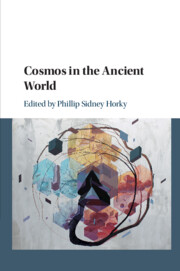Book contents
- Cosmos in the Ancient World
- Cosmos in the Ancient World
- Copyright page
- Dedication
- Epigraph
- Contents
- Contributors
- Acknowledgements
- An Historical Note on Kόσμος – Terminology
- Abbreviations
- Introduction
- Chapter 1 When Did Kosmos Become the Kosmos?
- Chapter 2 Ordering the Universe in Speech
- Chapter 3 Diakosmêsis
- Chapter 4 Aristotle on Kosmos and Kosmoi
- Chapter 5 Order and Orderliness
- Chapter 6 Polis as Kosmos in Plato’s Laws
- Chapter 7 Relating to the World, Encountering the Other
- Chapter 8 Tradition and Innovation in the Kosmos–Polis Analogy
- Chapter 9 Cosmic Choruses
- Chapter 10 All the World’s a Stage
- Chapter 11 The Architectural Representation of the Kosmos from Varro to Hadrian
- Chapter 12 “The Deep-Sticking Boundary Stone”
- Chapter 13 Cosmic Spiritualism among the Pythagoreans, Stoics, Jews and Early Christians
- Afterword
- Bibliography
- Index Locorum
- General Index
Afterword
Published online by Cambridge University Press: 18 June 2019
- Cosmos in the Ancient World
- Cosmos in the Ancient World
- Copyright page
- Dedication
- Epigraph
- Contents
- Contributors
- Acknowledgements
- An Historical Note on Kόσμος – Terminology
- Abbreviations
- Introduction
- Chapter 1 When Did Kosmos Become the Kosmos?
- Chapter 2 Ordering the Universe in Speech
- Chapter 3 Diakosmêsis
- Chapter 4 Aristotle on Kosmos and Kosmoi
- Chapter 5 Order and Orderliness
- Chapter 6 Polis as Kosmos in Plato’s Laws
- Chapter 7 Relating to the World, Encountering the Other
- Chapter 8 Tradition and Innovation in the Kosmos–Polis Analogy
- Chapter 9 Cosmic Choruses
- Chapter 10 All the World’s a Stage
- Chapter 11 The Architectural Representation of the Kosmos from Varro to Hadrian
- Chapter 12 “The Deep-Sticking Boundary Stone”
- Chapter 13 Cosmic Spiritualism among the Pythagoreans, Stoics, Jews and Early Christians
- Afterword
- Bibliography
- Index Locorum
- General Index
Summary
This chapter synopsises and synthesises the contributions of the preceding chapters. Approaching cosmos as a ‘distribution of the sensible’ (in Jacques Rancière’s phrase), it traces the way kosmos operates to organize reality on the level of aesthetics, politics, ethics and epistemology and to integrate these various domains into a holistic vision. The chapter also stresses, however, the provisionality and partiality of that cosmic whole and considers the alternative visions of reality it precludes, the disorderly order that Heraclitus characterised as ‘the sweeping of random things scattered’ and that James Joyce terms ‘chaosmos’.
- Type
- Chapter
- Information
- Cosmos in the Ancient World , pp. 295 - 303Publisher: Cambridge University PressPrint publication year: 2019

